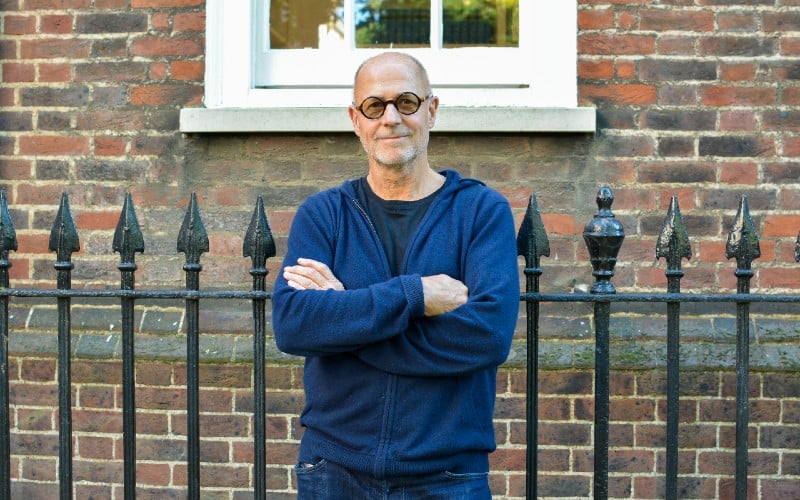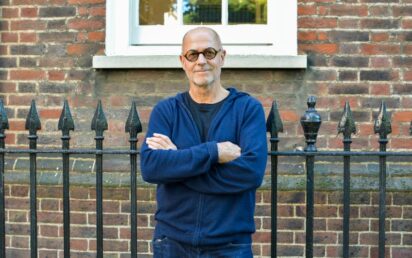When a chief executive departs a high-profile company they typically land another executive role – or else a series of non-exec board positions.
Dominic von Trotha Taylor took a different approach after leaving PayPoint in April 2019. “I had turned 60, I had young grandchildren and was working every hour,” he tells TechBlast.
“I very consciously wanted to avoid moving into another executive role at a big corporate. In my heart, I just love getting involved in businesses with younger people who are trying to do amazing things.”
Von Trotha Taylor – who does hold one chairmanship, at enterprise content automation platform Turtl – had led payments firm PayPoint from startup in 1997 through to IPO and into the FTSE250. It was this yearning for the startup world which turned his focus to iov42, a company he originally invested in back in 2016 which plans to revolutionise supply chains through blockchain technology.
It is not the first unconventional decision he has made. The child of antique dealers on the Portobello Road in London, the young Von Trotha Taylor emerged from state school and promptly spent 12 years on board submarines in the Royal Navy.
He flipped again to join Vodafone in the very early days of cellular telephony – helping to set them up in Germany – before becoming its first product manager for text messaging as that service was launched.
“I joined Granada, working for a classic big corporate – and I loathed it,” he recounts. “I really like young businesses: startups are very direct and have a clear line. I joined PayPoint and shortly afterwards became CEO… I ran that business for the best part of 22 years.
“One of the things I love about being in one place for a long time is you end up being held to account for what you said three years before. Of course, your plans don’t always happen as you expect them to, because life isn’t like that.
“And so my view on running any business – whether it’s a startup or a corporate concern – is you’ve got to have an inherently flexible nature… but also a core idea or purpose that keeps you true all the way through that flexibility.
“When you’re a startup, what you’re there to do is very obvious, because that’s why you started up; but 20 years later, as you navigate through the shifting sands, trying to ensure that that core idea is still the same is something I found very helpful.”
The vision at iov42 – named after the answer to life, the universe and everything in Douglas Adams’ The Hitchhiker’s Guide to the Galaxy – is grand. Von Trotha Taylor, now its chairman and CEO, describes meeting founder Robert Zapfel for the first time.
“The internet today is absolutely amazing for the exchange of communication, but it’s hopeless for exchange of value: you don’t really know who you’re dealing with online or whether what is said is true. That was his vision,” says Von Trotha Taylor of that meeting back in 2016.
“He wanted to use blockchain technology to build a completely new platform which allows value to be exchanged on a trusted basis. ‘We’re going to rebuild the internet,’ he told me.
“I thought: ‘Wow, that’s a pretty ambitious vision!’ So I chucked some money in and became a very early shareholder. When I left PayPoint I had some free time to get involved and started helping them out with some ideas to get them organised.”
A team of technical people, iov42 needed to commercialise. “He invited me to become the CEO of his business,” says Von Trotha Taylor.
“The core purpose comes down to: do I know who I’m really dealing with here? Do I know that this asset is real? Do I know that it is legally able to be traded? Do I know when the transaction was completed?
“Any software company can build on our platform using our tools to answer these fundamental questions.”
Blockchain is lauded for its inherent ability to provide unalterable transparency around transactions and contracts – but that is not enough, says Von Trotha Taylor.
“Where is that information coming from? If you put rubbish in, you get rubbish out,” he explains. “Our business is swimming against the tide of what you’ll read about every day in crypto and blockchain.
“What we’ve built is orientated for governments and large enterprises, as opposed to consumers and [the] crypto [investment market]. We don’t have a coin. We’re trying to move away from the hype to articulate really clear and logical answers to problems.”
The first application of the platform is Timber Chain, launched this year, which imparts digital identities to each stakeholder in the supply chain and represents timber as digital assets.
The application was devised in partnership with environmental non-profit organisation Preferred by Nature, and has been built to improve and safeguard the interactions between all stakeholders, from forest to shelf.
“We mapped the whole piece: where logs are felled, when they arrive at the sawmill, are converted into planks then stored and exported to another country,” he says. “We built that application in four weeks, which is amazing.
“The mechanism is called claims and endorsement. Claims are made around people’s identities and the assets; these are then endorsed by official bodies.
“Imagine a tree being felled in a forest: a person claiming to be the landowner would be signed off by the government; if they claim to employ 60 people who are all paid a fair wage, this can again be endorsed [by a relevant body]; a satellite company can certify that images of changes in the forest are true; a forest ranger describing the routine they run to look after the trees in terms of fire protection can be endorsed too.
“So you get a whole map of credentials certified by legitimate people and organisations. You start to trust it more – and intuitively the more valuable it becomes because you’re more likely to buy that than one which has no information.”
The international illegal timber trade is said to be worth between $50 billion and $150bn, with illegal timber estimated to account for between 50% and 90% of wood harvested from Amazonia, Central Africa and Southeast Asia.
“Of the 100% of the tree that started the journey to be made into planks, maybe only 80% of it is left, because the rest of it has gone to be pulped for paper,” explains Von Trotha Taylor.
“So how are we going to stop illegal wood topping that back up to 100%? That’s what happens in the supply chain.
“You can track it all the way through so ultimately IKEA, for example, can point at a table and absolutely show the provenance of the wood – while we can also show all the reuse of the product.”
iov42, which has a base in Austria and employs 18 software engineers among its 30 staff, has been approached by companies about providing provenance for palm oil and cotton, while it is also in the early stages of talks with music businesses about intellectual property.
A breakthrough moment for the London-based company was being invited by the European Commission to shape the future of public blockchain services in Europe – beating out corporate giants.
The European Blockchain Partnership is aiming to create blockchain-based services for public administrations – benefiting citizens, society and the economy. It was hand-picked by the EC as the only UK company to design and develop the next generation of the European Blockchain Services Infrastructure (EBSI), which is one of the most significant new blockchain projects globally.
Due to enter its second phase towards the end of this year, upon completion it aspires to facilitate up to 15 billion transactions per minute.
“The world of governments and enterprises is really just turning to the subject,” says Von Trotha Taylor. “The way I talk to the team is: we’ve got to be very clear about what our solution is and the way it works.
“We have four values: integrity; quality over speed; we always want our people to look forward; and we want them to act like an owner.
“I’ve been amazed how important those four values have defined the way in which we work, talk and present ourselves. Even people halfway down the organisation will have a meeting with an external agency and say, ‘right, let’s review and compare it against our values and whether we were true to them’.
“I’ve never seen that in any of my other businesses. So that says a lot about this business and the people that are in it.”


